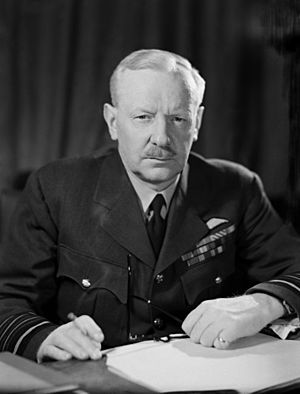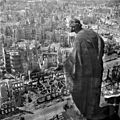Arthur Harris facts for kids
Quick facts for kids
Sir Arthur Harris, 1st Baronet
|
|
|---|---|

Air Chief Marshal Sir Arthur Travers Harris, 24 April 1944
|
|
| Birth name | Arthur Travers Harris |
| Nickname(s) | Bomber Harris |
| Born | 13 April 1892 Cheltenham, Gloucestershire, England |
| Died | 5 April 1984 (aged 91) Goring-on-Thames, Oxfordshire, England |
| Allegiance | |
| Service/ |
British Army (1914–18) Royal Air Force (1918–46) |
| Years of service | 1914–46 |
| Rank | Marshal of the Royal Air Force |
| Commands held | Bomber Command (1942–45) No. 5 Group (1939–40) RAF Palestine and Transjordan (1938–39) No. 4 Group (1937–38) RAF Pembroke Dock (1933) No. 210 Squadron (1933) No. 58 Squadron (1925–27) No. 45 Squadron (1922–24) No. 31 Squadron (1921–22) No. 50 Squadron (1918–19) No. 44 Squadron (1918) No. 191 Squadron (1918) |
| Battles/wars | First World War Arab revolt in Palestine Second World War |
| Awards | Knight Grand Cross of the Order of the Bath Officer of the Order of the British Empire Air Force Cross Mentioned in Despatches (2) Order of Suvorov, 1st Class (USSR) Distinguished Service Medal (United States) Chief Commander of the Legion of Merit (United States) Grand Cross of the Order of Polonia Restituta (Poland) Grand Cross of the Order of the Southern Cross (Brazil) Grand Officer of the Legion of Honour (France) Croix de guerre (France) |
| Other work | Manager of the South African Marine Corporation |
Marshal of the Royal Air Force Sir Arthur Travers Harris (born 13 April 1892 – died 5 April 1984) was a very important leader in the Royal Air Force (RAF) during the Second World War. He was in charge of RAF Bomber Command, which was the part of the RAF that used bombers. People often called him "Bomber" Harris because of his role in bombing German cities.
Born in England, Harris moved to Rhodesia (now Zimbabwe) when he was 17. He joined the army there when the First World War started. Later, he returned to England and joined the Royal Flying Corps, which became the RAF in 1918. He stayed in the RAF for many years, serving in different parts of the world.
When the Second World War began in 1939, Harris became the head of Bomber Command in 1942. The British government decided to use "area bombing" against German cities. This meant bombing large areas to damage factories and disrupt daily life. Harris was responsible for carrying out this plan. He worked to improve bombing methods and technology. After the war, he moved to South Africa. He was given the title of Baronet in 1953.
Harris's choice to focus on "area bombing" rather than targeting specific military factories is still talked about today. Some people thought it was not the best way to fight. Others were concerned about the large number of civilians who were hurt or killed.
Contents
Arthur Harris's Early Life
Arthur Harris was born in Cheltenham, England, on 13 April 1892. His father worked in India, so Arthur spent much of his childhood with a family friend, a reverend named C. E. Graham-Jones. He went to Allhallows School in Devon.
When he was 17, Arthur decided he wanted to move to Southern Rhodesia. He was inspired by a play about a farmer there. He told his father he wanted to go, even though his father hoped he would join the military. In 1910, Harris sailed to Africa.
For several years, he worked in Rhodesia doing jobs like mining and farming. He learned a lot about ranching. By 1914, he was managing a farm. He felt like a Rhodesian and planned to start his own farm there.
Military Career Begins
Joining the War Effort
When the First World War started in August 1914, Harris was in the bush and didn't hear about it right away. Even though he wanted to be a farmer, he felt it was his duty to join the war. He joined the 1st Rhodesia Regiment as a bugler.
His unit served in South-West Africa in 1915. This campaign involved long marches in the desert. Harris later said he never wanted to walk if he could ride in a vehicle after that experience. He also saw his first aerial bombing, though it caused no damage.
After the campaign, Harris returned to Rhodesia. But when it became clear the war in Europe would last longer, he decided to go to England. In October 1915, he arrived in London. He tried to join the cavalry and artillery but ended up joining the Royal Flying Corps in November 1915.
Flying in the First World War
Harris learned to fly in late 1915. He served in France in 1917 as a flight commander. He flew planes like the Sopwith 1½ Strutter and Sopwith Camel. He was credited with shooting down five enemy aircraft. He was awarded the Air Force Cross in November 1918. He ended the war as a Major.
Between the World Wars
After the First World War, Harris stayed in the newly formed Royal Air Force (RAF). He served in places like India, Mesopotamia, and Persia. He became involved in bombing during conflicts in these areas. He helped develop bombing techniques, like using delay-action bombs.
In the 1920s, Harris sometimes thought about leaving the RAF to go back to Rhodesia. But he stayed. He helped create the idea of "area bombing" in Iraq in 1923. He also worked on "night training for night operations." He was promoted to Officer of the Order of the British Empire in 1927.
From 1927 to 1929, he attended the Army Staff College. He was promoted to group captain in 1933. From 1934 to 1937, he worked in the Air Ministry. He was then sent to Middle East Command in Egypt. In 1936, he visited Southern Rhodesia to help them set up their own air force.
In 1937, Harris was promoted to air commodore. In 1938, he took command of No. 4 (Bomber) Group. He also pushed for the development of large strategic bombers that could reach targets in Germany from England. These efforts led to planes like the Avro Lancaster.
Leading Bomber Command in World War II
Taking Charge of Bomber Command
In September 1939, Harris returned to Britain to command No. 5 Group. He was made Deputy Chief of the Air Staff in November 1940. In February 1942, he was appointed Commander-in-Chief (C-in-C) of Bomber Command.
In 1942, the British government decided to start "area bombing" German cities. This was a strategy to destroy large parts of cities. Harris was given the job of carrying out this plan. He believed this was an important part of the war against Germany.
Harris famously said, "The Nazis entered this war under the rather childish delusion that they were going to bomb everyone else, and nobody was going to bomb them... They sowed the wind, and now they are going to reap the whirlwind."
Developing Bombing Strategies
At first, bombing was not very effective because there weren't many planes and navigation was difficult. As more and better aircraft were made, Harris pushed for much larger raids. He wanted to use 1,000 planes in a single attack. In May 1942, he launched the first RAF "thousand bomber raid" against Cologne. This raid used a new tactic called a "bomber stream" to overwhelm German defenses.
Harris believed that massive bombing alone could force Germany to surrender. He often told his superiors that the war would end soon because of the bombing. However, Prime Minister Winston Churchill was not always comfortable with the area bombing strategy. Official statements often said that Bomber Command was only attacking military targets, and civilian casualties were accidental.
In October 1943, Harris urged the government to be open about the bombing goals. He said the aim was "the destruction of German cities, the killing of German workers, and the disruption of civilised life throughout Germany."
Challenges and Controversies
In November 1943, Bomber Command began the Battle of Berlin. Harris hoped to repeat the success of the Battle of Hamburg, but Berlin was a much harder target. The city was better prepared, and no huge firestorms happened. German anti-aircraft defenses were also very strong, and many British bombers were lost.
Before the D-Day invasion in 1944, Harris was told to bomb French railway networks. He disagreed with this, feeling it took away from the main goal of bombing German industry. After D-Day, Harris continued to favor area bombing.
One of the most talked-about raids of the war was the bombing of Dresden in February 1945. This attack by the RAF and USAAF caused a deadly firestorm and killed many civilians. Estimates suggest around 25,000 people died. Some raids late in the war, like the one on Pforzheim, have been criticized for causing many civilian deaths with little military gain.
Harris believed that bombing cities was justified if it helped shorten the war and save the lives of Allied soldiers. He said, "I do not personally regard the whole of the remaining cities of Germany as worth the bones of one British Grenadier."
After the War
Honors and Retirement
After the war, Harris received many awards and honors. He was promoted to Marshal of the Royal Air Force in January 1946. However, there was some concern in the British government about the destruction caused by the bombing of German cities.
Harris retired in September 1946. He wrote a book called Bomber Offensive about Bomber Command's work. He refused a peerage (a special title like Lord) in protest because his Bomber Command crews did not receive a separate campaign medal. He was the only commander-in-chief not to become a peer.
Harris had hoped to return to Southern Rhodesia as governor. But this did not happen. In 1948, he moved to South Africa. He managed a shipping company called the South African Marine Corporation (Safmarine) until 1953.
In February 1953, Prime Minister Winston Churchill insisted that Harris accept a baronetcy, a special title. So, he became a Baronet. He then returned to the UK and lived in Goring-on-Thames.
In 1974, Harris appeared in the TV documentary series The World At War. He talked about the area-bombing strategy he used during the war.
Awards and Family Life
- Knight Grand Cross of the Order of the Bath
- Officer of the Order of the British Empire
- Air Force Cross
- Mentioned in Despatches (twice)
- Order of Suvorov, 1st Class (USSR)
- Distinguished Service Medal (United States)
- Chief Commander of the Legion of Merit (United States)
- Grand Cross of the Order of Polonia Restituta (Poland)
- Grand Cross of the Order of the Southern Cross (Brazil)
- Grand Officer of the Legion of Honour (France)
- Croix de guerre (France)
Harris married Barbara Daisy Kyrle Money in August 1916. They had three children: Anthony, Marigold, and Rosemary. They divorced in 1935. He later married Therese ('Jillie') Hearne in 1938. They had one daughter, Jacqueline Jill.
Arthur Harris's Legacy
Harris died on 5 April 1984, at his home in Goring-on-Thames. He was almost 92 years old. He is buried in Burntwood Cemetery in Goring.
In 1989, a TV drama called Bomber Harris was made about his time leading Bomber Command.
In 1992, a statue of Sir Arthur Harris was put up outside the RAF Church of St Clement Danes in London. This caused some protests, especially from people in Germany. Queen Elizabeth The Queen Mother unveiled the statue. An inscription on the statue says: "The Nation owes them all an immense debt." Many former Bomber Command aircrew were there. The statue needed guards for months because it was often damaged by protesters.
Images for kids
See also
 In Spanish: Arthur Harris para niños
In Spanish: Arthur Harris para niños
 | Kyle Baker |
 | Joseph Yoakum |
 | Laura Wheeler Waring |
 | Henry Ossawa Tanner |



